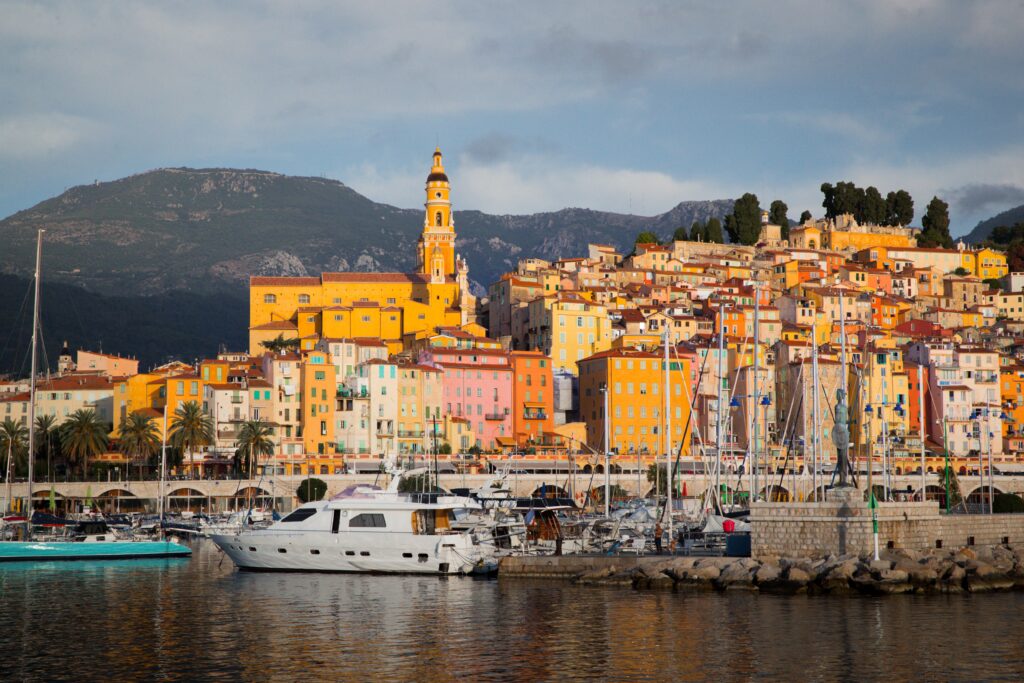VISIT AUSTRIA
Elegant cities, Alpine peaks, and a musical legacy that shaped the world, Austria is where imperial grandeur meets mountain beauty.
Currency
€ - Euro (1€ ≃ 1,05$ ≃0,86£)
POPULATION
9,0 millions
MAIN LANGUAGE
German
AREA
83,879 km²
TIME ZONE
UTC+1 / UTC+2
FLAG
🇦🇹
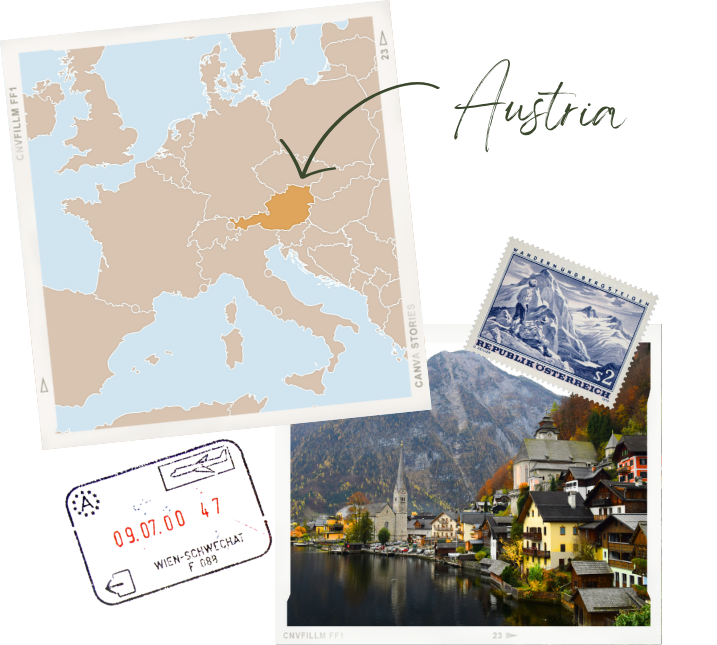
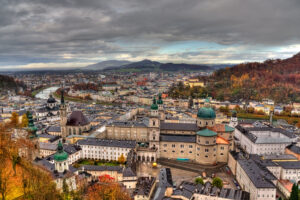
GO SOUND OF MUSIC IN SALZBURG
Salzburg charms with its baroque old town, hilltop fortress, and ties to Mozart. Fans of The Sound of Music will love tracing filming locations around the city.

CATCH A CLASSICAL CONCERT
Austria’s musical legacy lives on with world-class classical concerts held in majestic venues, from Vienna’s Musikverein to Salzburg’s Festival Halls.
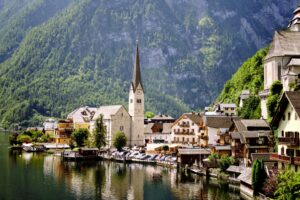
EXPLORE HALLSTATT
This fairy-tale lakeside village is known for its pastel houses, mountain backdrop, and photogenic charm.
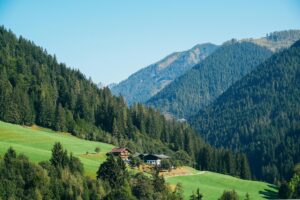
SKI OR HIKE IN THE AUSTRIAN ALPS
Austria offers year-round adventures: skiing in Tyrol, hiking in Vorarlberg, or cable car rides to alpine lakes and panoramic peaks.

ADMIRE VIENNA’S IMPERIAL SPLENDOUR
From the Hofburg Palace to Schönbrunn, Vienna is steeped in imperial history. Don’t miss a stroll around the Ringstrasse or a slice of Sachertorte in a historic café.
Pick an Austrian destination

Vienna
Capital of Austria, known for imperial palaces, classical music, and elegant coffeehouses.
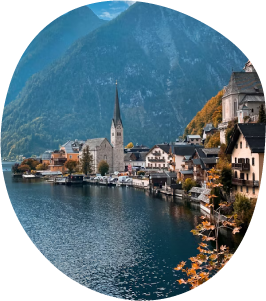
Hallstatt
Picturesque lakeside village with Alpine charm and ancient salt mine history.
Prepare your trip to Austria
💡 Why visit Austria?
Austria enchants visitors with its blend of imperial history, alpine scenery, and cultural sophistication. From the elegant streets of Vienna to the baroque beauty of Salzburg and the snow-capped peaks of Tyrol, the country offers something year-round. Whether you’re into classical music, skiing, hiking, or lakeside relaxation, Austria delivers with charm and quality.
🪪 Do I need a visa to visit Austria?
Austria is part of the Schengen area. Citizens of the EU, USA, Canada, Australia, and many other countries can enter visa-free for up to 90 days within a 180-day period. However, some nationalities do require a visa. It’s best to check with the nearest Austrian embassy or consulate for the most up-to-date information specific to your situation.
IMPORTANT NOTE: The information below is provided merely as an indication and applies for short-term tourism visa purposes only. Before your trip to Austria, or if you are planning to come to Austria for another purpose (work, studies, …), check the official information on the European Commission website’s page about Schengen visa application: https://www.home-affairs.ec.europa.eu/
⏳ Visa-free but limited to maximum 90 days for a period of 180 days if you are a citizen of one of the following countries: Albania; Andorra; Antigua and Barbuda; Argentina; Australia; Austria; Bahamas; Barbados; Belgium; Bosnia and Herzegovina; Brazil; Brunei; Bulgaria; Canada; Chile; Colombia; Costa Rica; Croatia; Czechia; Denmark; Dominica; El Salvador; Estonia; Finland; France; Georgia; Germany; Greece; Grenada; Guatemala; Honduras; Hong Kong; Hungary; Iceland; Israel; Italy; Japan; Kiribati; Kosovo; Latvia; Liechtenstein; Lithuania; Luxembourg; Macau; Malaysia; Malta; Marshall Islands; Mauritius; Mexico; Micronesia; Moldova; Monaco; Montenegro; Netherlands; New-Zealand; Nicaragua; North Macedonia; Norway; Palau; Panama; Paraguay; Peru; Poland; Portugal; Romania; Saint Kitts and Nevis; Saint Lucia; Saint Vincent and the Grenadines; Samoa; San Marino; Serbia; Seychelles; Singapore; Slovakia; Slovenia; Solomon islands; South Korea; Spain; Sweden; Switzerland; Taiwan; Timor-Leste; Tonga; Trinidad and Tobago; Tuvalu; Ukraine; United Arab Emirates; United Kingdom; United States of America; Uruguay; Vatican; Venezuela
🛂 Visa required if you are a citizen of one of the following countries: Afghanistan; Algeria; Angola; Armenia; Azerbaijan; Bahrain; Bangladesh; Belarus; Belize; Benin; Bhutan; Bolivia; Botswana; Burkina Faso; Burundi; Cambodia; Cameroon; Cape Verde; Central African Republic; Chad; China; Comoros; Congo; Congo (Dem. Rep); Cote d’Ivoire (Ivory Coast); Cuba; Djibouti; Dominican Republic; Ecuador; Egypt; Equatorial Guinea; Eritrea; Eswatini; Ethiopia; Fiji; Gabon; Gambia; Ghana; Guinea; Guinea-Bissau; Guyana; Haiti; India; Indonesia; Iran; Iraq; Jamaica; Jordan; Kazakhstan; Kenya; Kuwait; Kyrgyzstan; Laos; Lebanon; Lesotho; Liberia; Libya; Madagascar; Malawi; Maldives; Mali; Mauritania; Mongolia; Morocco; Mozambique; Myanmar; Namibia; Nauru; Nepal; Niger; Nigeria; North Korea; Oman; Pakistan; Palestine; Papua New Guinea; Philippines; Qatar; Russia; Rwanda; Sao Tome and Principe; Saudi Arabia; Senegal; Sierra Leone; Somalia; South Africa; South Sudan; Sri Lanka; Sudan; Suriname; Syria; Tajikistan; Tanzania; Thailand; Togo; Tunisia; Turkey; Turkmenistan; Uganda; Uzbekistan; Vanuatu; Vietnam; Yemen; Zambia; Zimbabwe
⛅ When is the best time to visit Austria?
❄️ December – February: Winter transforms Austria into a snow lover’s paradise. Ski resorts in Tyrol, Vorarlberg, and Salzburg attract visitors from around the world. Vienna and Salzburg also host festive Christmas markets, with temperatures ranging from -5°C (23°F) to 5°C (41°F).
🌱 March – May: Spring is ideal for city exploration and enjoying blooming alpine meadows. The weather warms up, but popular spots are still quieter than in summer.
☀️ June – August: Summer is warm and perfect for hiking, biking, and attending outdoor music festivals. Cities can get busy with tourists, especially Vienna and Salzburg. Temperatures range from 15°C (59°F) to 30°C (86°F), depending on the region.
🍂 September – November: Autumn brings colorful foliage and fewer crowds. It’s an excellent time for cultural visits, wine festivals, and exploring Austria’s many lakes and mountain villages.
🚉 How to get around Austria?
Austria has a well-developed and punctual transport system:
🚌 Buses: Buses serve rural areas and complement the rail network. Long-distance services like FlixBus connect Austria with other European countries.
🚂 Trains: The train network is excellent. ÖBB (Austrian Federal Railways) runs high-speed and regional trains connecting cities and scenic regions efficiently and comfortably.
🚗 Car Rental: Renting a car is convenient for exploring alpine regions or smaller towns. Roads are well maintained, but note that you’ll need a vignette (toll sticker) for driving on motorways. An IDP is not required if your license is in Latin script.
💳 Can I use bank cards or cash for payments in Austria?
Both are commonly used. Credit and debit cards are widely accepted, particularly Visa and Mastercard. However, smaller businesses, especially in rural areas, may prefer cash. It’s recommended to carry some euros.
🔌 What type of plugs and voltage does Austria use?
Austria uses two plug types: C and F. They have two grounding holes. Most European plugs work, but check compatibility before you go. Austria operates on a 230V supply voltage and 50Hz frequency.
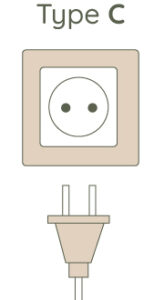
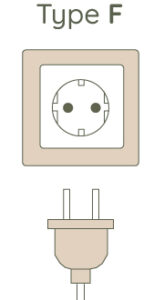
If needed, you can order an universal travel plug adapter here.
🪙 Is tipping customary in Austria?
Tipping is customary and appreciated but not mandatory. Rounding up the bill or leaving 5-10% is standard in restaurants, cafés, and taxis.
🥛 Is it safe to drink tap water in Austria?
Tap water is safe to drink throughout Austria.
📅 When are public holidays and store closing days in Austria?
Sunday is a closing day for many stores. National holidays in Austria include:
- New Year’s Day (January 01)
- Epiphany (January 06)
- Easter Monday (date varies)
- Labour Day (May 01)
- Ascension Day (date varies)
- Whit Monday (date varies)
- Corpus Christi (date varies)
- Assumption Day (August 15)
- National Day (October 26)
- All Saints’ Day (November 01)
- Immaculate Conception (December 08)
- Christmas Day (December 25)
- St. Stephen’s Day (December 26)
On these days, most businesses and offices will be closed, and many attractions may be shut or have limited opening hours.
🚦 What are the speed limits in Austria?
In Denmark, traffic drives on the right-hand side of the road. The main speed limits are as follows:
- 50 kph / 30mph in urban areas
- 100 kph / 62 mph on rural roads
- 130 kph / 80 mph on motorways
During adverse weather (rain, fog, etc.), the speed limits are lowered.
💬 What are some basic German words I should know?
- Hello (informal) = Hallo
- Good day = Guten Tag
- Goodbye = Auf Wiedersehen
- Yes = Ja
- No = Nein
- Thank you = Danke
- Please = Bitte
- You’re welcome = Gern geschehen
- Excuse me = Entschuldigung
- Day = Tag
- Night = Nacht
- Good evening = Guten Abend
- Goodnight = Gute Nacht
- Mister = Herr
- Ma’am = Frau
- Street = Straße
- Road = Weg
💡 Tip: With the GoogleTranslate app, you can download the German language to use it even offline!
🛡️ Is it safe to travel in Austria?
Austria is one of the safest countries in Europe. Crime rates are low, and public transportation is secure. Basic precautions apply:
Secure Your Belongings: Pickpocketing can occur in busy tourist areas and train stations.
Emergency Numbers: Dial 112 for police, ambulance, or fire services anywhere in Austria.


